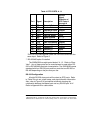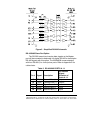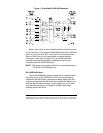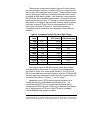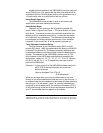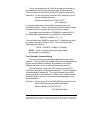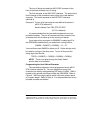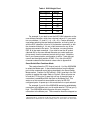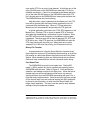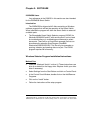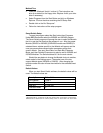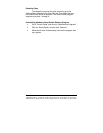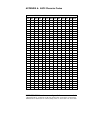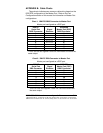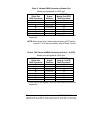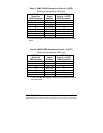
Documentation Number 232D4SS84502 Manual 17
B&B Electronics Mfg Co – 707 Dayton Rd - PO Box 1040 - Ottawa IL 61350 - Ph 815-433-5100 - Fax 815-433-5104
B&B Electronics Ltd – Westlink Comm. Pk – Oranmore, Galway, Ireland – Ph +353 91-792444 – Fax +353 91-792445
soon as the CTS line on port A was lowered. At that time any of the
other RS-232 ports on the 232D4SS8 can raise their CTS line to
establish connection. If port A is connected to the Master port and
any of the other RS-232 ports on the 232D4SS8 raises their CTS
line, the data sent to the 232D4SS8 from those ports would be lost.
The 232D4SS8 does not have buffering.
Note that when a port is selected via the Master port, the CTS
lines will be ignored until the Smart Switch receives the turn off
command from the Master port. When a CTS line selects the
Master port, all commands will be ignored until CTS goes low.
A typical application would be to tie CTS & RTS together on the
Master port. So when CTS on a port is raised, RTS on that port
also goes high establishing a connection for your hardware. Note
that RTS will be low until connection to the Master port has been
completed. The other ports will be held off because TD, RTS, and
DTR will be low. After CTS goes low, the 232D4SS8 will scan the
CTS lines starting with the next port. When there are no ports
selected Port A will have first priority, port B second and so on.
Binary File Transfer
A simple method of using the Smart Switch to transfer binary
files without the concern of it accidentally disconnecting, is to set the
file transfer at a baud rate different from the baud rate of the Smart
Switch. When transferring files at a different baud rate, the Smart
Switch will stay connected from the last command control string.
Port Select Test
The 232D4SS8 has a built-in port select test. Placing DIP
switch 1 (SW1) position 8 in the on position and powering up the
232D4SS8 starts this test. Refer to Figure 2. It will test the port
selection, and address circuits for all eight ports. When the test is
started each port will be individually turned on for one second,
starting with port A on the 232D4SS8 and ending with port H for a
total test time of eight seconds. Once the last port has been turned
off the test will start over and continue looping until SW1 position 8
is placed in the off position, at which time the Smart Switch will
begin normal operation. This test is can be used to verify address
settings of the port expander modules.



